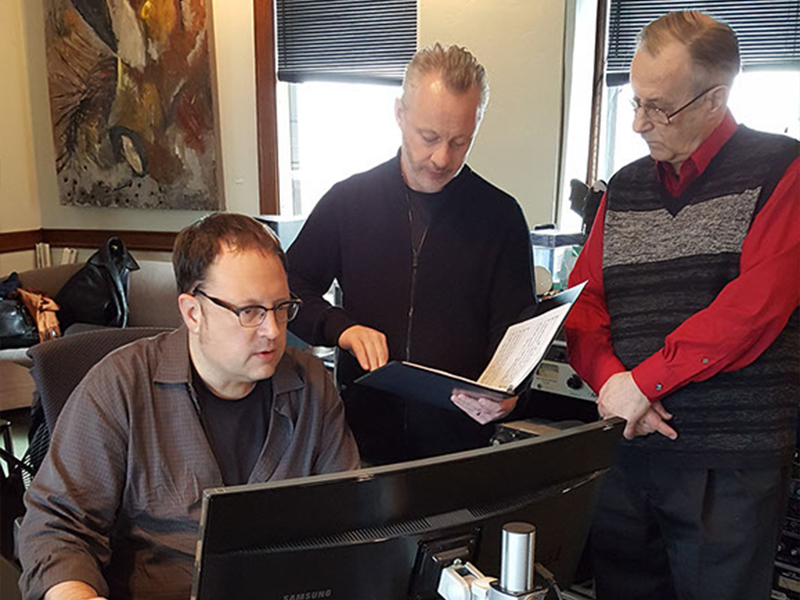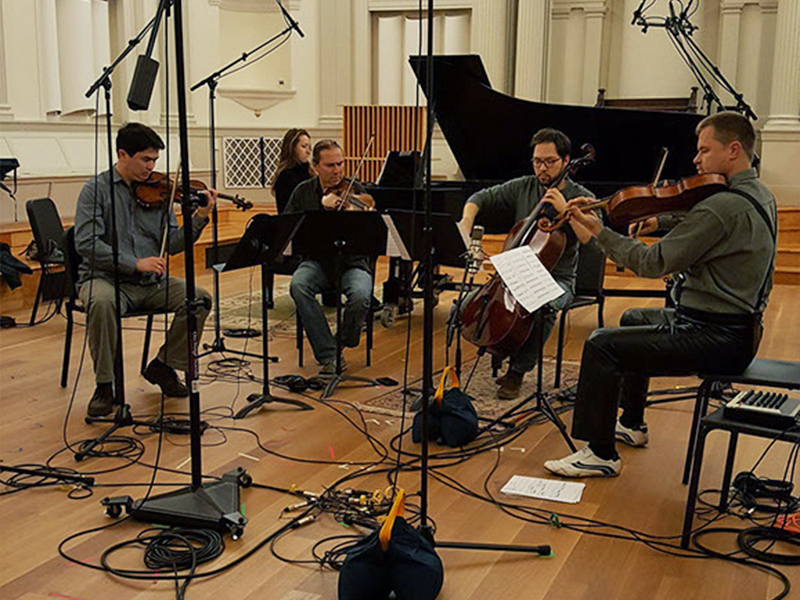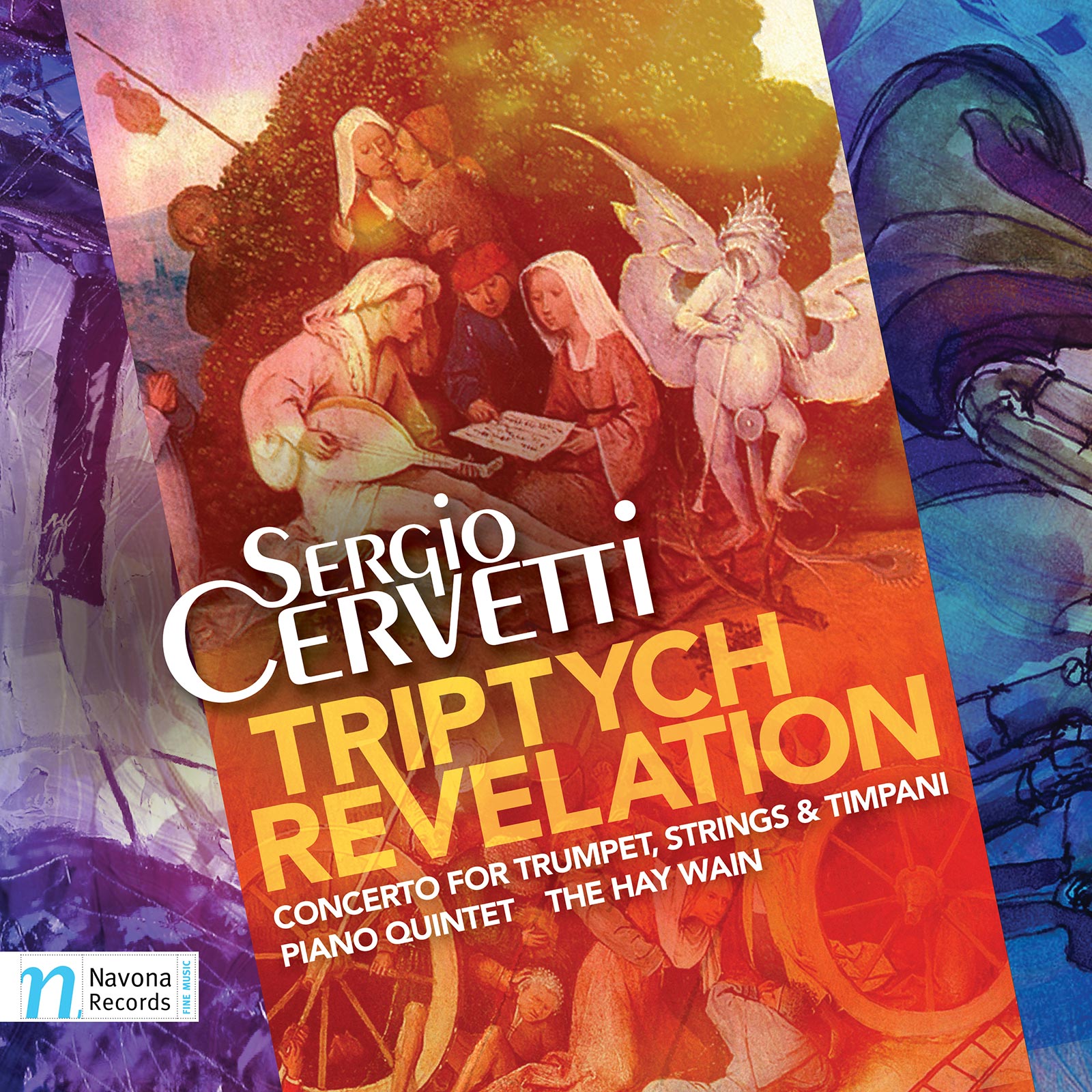
Share Album:
Triptych Revelation
Sergio Cervetti composer
TRIPTYCH REVELATION, composer Sergio Cervetti’s seventh album with Navona, presents works from across four decades of his extensive career. Though a fair bit of time separates these pieces, the album’s three works all feature unique explorations of apocalyptic themes, inspired by themes drawn from the New Testament, nineteenth century French literature, and Flemish art of the sixteenth century.
Inspired by portentous images from the Book of Revelation, Concerto for Trumpet, Strings, and Timpani (1973) pays specific homage to the passage, “And the seventh angel sounded the trumpet” (XI:15). Cervetti created the work as a trumpet aria, with three sections that unfold in a faceted continuum. Opening with a foreboding and menacing trumpet solo, the piece launches into full swing with tumultuous interplay between the brass and timpani. The final section’s viola and celli parts recall the Voices of Heaven, joined later by timpani and trumpet for an apocalyptic crescendo and finale.
Written in memory of the composer’s sister, Piano Quintet “Toward the Abyss” (2015) is molded from Charles Baudelaire’s poem Le Voyage and contemplates mortality and the voyage toward the afterlife. The work’s post-minimalist tendencies exhibit a mature dexterity, using salient aesthetic means such as scattered 12-tone rows, minimalism, glimmers of melody, and the synthesis of suspense in tone and material. A meditative sequence of ascending piano and string lines conjures imagery of a flame extinguished and fused with eternity, with the smoke fading into eternal resplendence in the last movement’s quotation of J.S. Bach’s chorale Before thy Throne I Now Appear.
The Hay Wain (1987), an electroacoustic tone poem, was inspired by the medieval triptych of the same name by painter Hieronymus Bosch. Cervetti uses a virtual orchestra redolent of the painter’s brush to create colorful, grotesque responses to Bosch’s horrifying representations of the world and its ultimate fate. In traversing this narrative, the composer draws inspiration for four movements from the painting, evoking imagery such as angels as insects falling to earth like confetti; a wagon laden with hay drawn by semi-human, semi-animal monsters; a tower of human pride constructed by sinners; and lovers sitting and playing the lute in bliss, oblivious of the abyss towards which they are being driven.
Listen
Stream/Buy
Choose your platform
Track Listing & Credits
| # | Title | Composer | Performer | |
|---|---|---|---|---|
| 01 | Concerto for Trumpet, Strings & Timpani "Septim Tubae" | Sergio Cervetti | Moravian Philharmonic Orchestra | Petr Vronsky, conductor; Ondřej Jurčeka, trumpet | 15:24 |
| 02 | Piano Quintet "Toward the Abyss": I. Toward the Abyss | Sergio Cervetti | Karolina Rojahn, piano; Omar Chen Guey, violin I; Rohan Gregory, violin II; Peter Sulski, viola; Jacques Lee Wood, cello | 7:30 |
| 03 | Piano Quintet "Toward the Abyss": II. Hell or Heaven, What Does It Matter? | Sergio Cervetti | Karolina Rojahn, piano; Omar Chen Guey, violin I; Rohan Gregory, violin II; Peter Sulski, viola; Jacques Lee Wood, cello | 7:00 |
| 04 | Piano Quintet "Toward the Abyss": III. To Discover Something New in the Depths of the Unknown | Sergio Cervetti | Karolina Rojahn, piano; Omar Chen Guey, violin I; Rohan Gregory, violin II; Peter Sulski, viola; Jacques Lee Wood, cello | 10:10 |
| 05 | The Hay Wain: I. Fall of the Rebel Angels | Sergio Cervetti | Created, engineered, and performed by Sergio Cervetti | 6:31 |
| 06 | The Hay Wain: II. The Lovers | Sergio Cervetti | Created, engineered, and performed by Sergio Cervetti | 6:02 |
| 07 | The Hay Wain: III. Demons Construct the Tower | Sergio Cervetti | Created, engineered, and performed by Sergio Cervetti | 6:05 |
| 08 | The Hay Wain: IV. The Procession | Sergio Cervetti | Created, engineered, and performed by Sergio Cervetti | 8:13 |
Concerto for Trumpet, Strings and Timpani, In Memoriam Amadeo Guigou Malan, 1871-1951.
Piano Quintet-Toward the Abyss, In Memoriam Sofía Cervetti, 1935-2016.
Concerto for Trumpet, Strings and Timpani was awarded Second Prize at the Primer Festival Latinoamericano de Música Contemporánea de la Ciudad Maracaibo in Venezuela in 1977.
The Hay Wain was originally released in 1987 on a Periodic Music CD, PE-1631. Equipment List for The Hay Wain: Yamaha DX-7, Yamaha FB-01, Ensoniq Mirage, Casio CZ-101, ARP Quadra, IBM PC running Personal Composer and Vision Software, Roland DEP Digital Processor, Alesis Midiverb, Yamaha DSP-1 Digital Processor.
The composer wishes to thank all the generous contributors who have supported his work and this project; to all the musicians, engineers, and the PARMA Team for their collaboration in producing this album; and to Ron Goldberg who originally produced The Hay Wain.
Sergio Cervetti’s work is available at The Arthur Friedheim Library and Archives at The Peabody Institute of The Johns Hopkins University.
Video documentation of Sergio Cervetti’s music and dance collaborations is archived at the New York Public Library’s Dance Collection/Dance Theater Workshop Permanent Archives, the BAM/Next Wave Video Archive for Contemporary Performing Arts, and the Lawrence and Lee Theatre Research Institute of Ohio State University.
Cover art detail of The Haywain by Hieronymus Bosch.
Photo of Sergio Cervetti by Pirjo-Leena Bauer.
All works © Sergio Cervetti Music.
www.sergiocervetti.com
Executive Producer Bob Lord
Executive A&R Sam Renshaw
Audio Director Jeff LeRoy
Engineer Manager Lucas Paquette
Art & Production Director Brett Picknell
Graphic Design Ryan Harrison
Marketing Scott Murphy
Artist Information
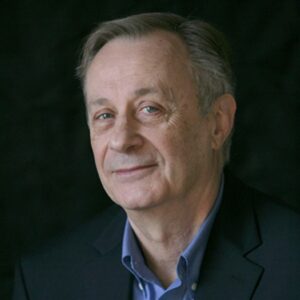
Sergio Cervetti
Sergio Cervetti left his native Uruguay in 1962 to study composition in the United States. In 1966 he attracted international attention when he won the chamber music prize at the Caracas, Venezuela Music Festival. After studying with Ernst Krenek and Stefan Grové and graduating from Peabody Conservatory, he was subsequently invited to be Composer-in-Residence in Berlin, Germany in 1969-70.
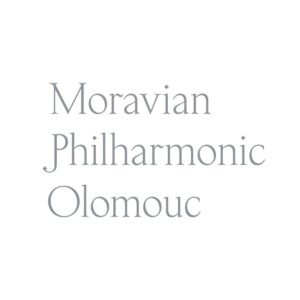
Moravian Philharmonic Orchestra
The Moravian Philharmonic Orchestra is one of the foremost and oldest symphony orchestras in the Czech Republic. It is based in the historical capital of Moravia, the city of Olomouc, and has been a leader of music activities in the region for the past 70 years. Its artistic development was directly influenced by distinguished figures from the Czech and international music scene.
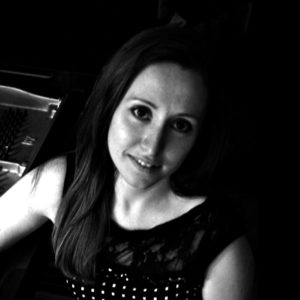
Karolina Rojahn
Karolina Rojahn is a Los Angeles based pianist who has dedicated the last decade of her career to premiering and recording contemporary music repertoire. She has premiered over a hundred new works and collaborated with various classical music labels, most notably Naxos, having released over 43 recordings of chamber and solo piano music, including 5 piano concertos written specifically for her.
Rohan Gregory
Rohan Gregory, violin, a native of Keene, New Hampshire, and a longtime participant at Apple Hill, is a founding member of the internationally renowned Arden String Quartet, praised in the New York Times as “vivid, strong and colorful.” When not in the Boston area to perform with the Boston Lyric Opera, the New England String Ensemble, or the Boston Modern Orchestra Project, Rohan may be found on tour in Europe with The Klezmatics, in Thailand with flute player Abbie Rabinowitz, or in India with the Indo Jazz Fusion group Natraj.
Omar Chen Guey
Brazilian violinist Omar Guey has performed internationally as a soloist with orchestras, in recitals and chamber music concerts throughout Brazil as well as the United States, Europe, Taiwan, Kenya, and the Seychelles. He has been a featured soloist with the Brazilian, Campinas, Goiania, Minas Gerais, Claudio Santoro National Theater, Sao Paulo University, Sao Paulo Municipal, and the State of Sao Paulo Symphony Orchestras, as well as the Amazonas Philharmonic, Petrobras Pro-Musica, Experimental Repertoire, Manhattan School of Music, Stony Brook University Symphony, Maidstone Symphony and the Seychelles International Music Festival Orchestras. Following a recital in Oslo, Norway, he had the honor of performing for the King of Norway, Harald V. He is a prize winner at both Tibor Varga and Lipizer International Violin Competitions in Switzerland and Italy, respectively.
Ondřej Jurčeka
Ondřej Jurčeka is a trumpet player and performs with the Moravian Philharmonic Orchestra among others.
John Page
John Page began his career with the National Symphony Orchestra of Ireland in 2000. Prior to this he studied at King’s College London, University College Dublin, Trinity College Dublin, and Harvard University. In Ireland, his 2002 performances of Viktor Ullmann’s The Emperor of Atlantis with Opera Theatre Company garnered the prestigious Irish Times Opera of the Year award. He was subsequently invited to give a Lyric FM broadcast concert with the NSOI. He is also the Music Director of the Portsmouth Symphony Orchestra.
Peter Sulski
Peter Sulski was a member of the London Symphony Orchestra for seven years. While in England he served on the faculty of the Royal College of Music and Trinity College of Music and Drama, as well as being Artistic Director of Chapel Royal Concerts, which he founded in 1993. For seven years he gave the annual Viola Masterclass, along with many solo recitals and chamber music concerts at the Dartington International Summer School. He gave his Carnegie Hall debut in 1999, and his first London South Bank appearance in 2001.
Petr Vronsky
Petr Vronsky is a Czech conductor. From 1983-1991 he conducted the Brno Philharmonic Orchestra. He currently conducts the Moravian Philharmonic.
Jacques Lee Wood
Noted for his expressive warmth, sensitivity, and technical ease, cellist Jacques Lee Wood enjoys an active and varied musical career. His interest in teaching and research complements a performance career that covers a broad range of repertoire and interests: from historically informed performance on baroque cello, commissioning and performing new works on modern cello, to playing bluegrass banjo, mandolin, and cello with his NYC-based group Cathedral Parkway.
